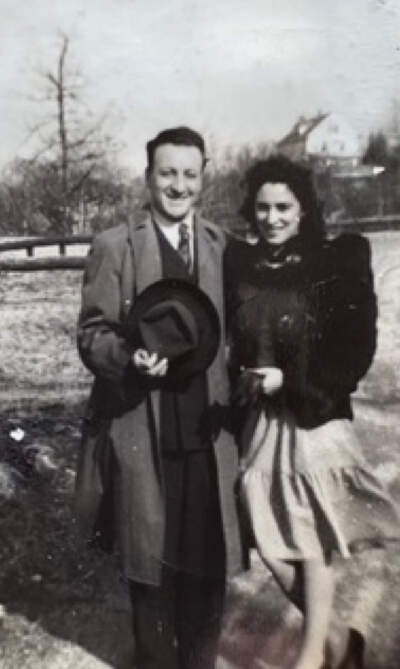Advertisement
Commentary
‘I was dreaming to come to America’

Behind me on a huge screen, a scratchy, ancient black and white film showed people who looked like me, who could be related to me, stumbling down a gangplank, looking both awed and terrified, carrying overstuffed bags and wailing children.
Also behind me, sat the entire Plymouth Philharmonic orchestra about to launch into the opening bars of Peter Boyer’s Ellis Island Symphony: The Dream of America.
That symphony is more than 20 years old now. The spoken text of the piece is drawn directly from interviews with seven immigrants, from seven different countries, who came to America through Ellis Island in the first half of the 20th century.
I was standing at the podium facing a full house, waiting for my cue to begin the spoken parts of the performance.
I placed my script on the podium and gave a slight nod to my cousin, who sat in the first row of seats, about eight feet away. She and her girlfriend smiled at me. I turned back to the podium and opened the three-ring binder to my first set of lines.
That’s when I realized I’d left my glasses in the green room. The page swam before me, unreadable as a tome in Sanskrit. The music swelled behind me, my cue only seconds away.
My cousin registered the alarm on my face as I stealthily searched the pockets of my jacket and came up empty. I whispered an easily recognizable obscenity. When I looked up, we locked eyes and I indicated (subtly, I hope): “No glasses.” She nudged her girlfriend, who pulled out a pair of readers, scuttled toward the podium and handed them up to me. I put them on and discovered that the readers are the exact same strength as the ones I left backstage.
The whoosh of terror began to subside.
Advertisement
My ancestors, my Italian antenati behind me onscreen, no longer appeared so overwhelmed. In fact, they seemed to be smiling, as I spoke the words of Helen Lansman Cohen, 20, an immigrant from Poland:
“I was dreaming to come to America.”
My Italian immigrant mother was not dreaming to come to America.
In 1935, she was 16, living on a garlic farm in Sulmona, Abruzzo, about 90 miles west of Rome, when her father wanted to arrange a marriage to an old man who brought a dowry of adjoining land to the contract.

Benito Mussolini was in power. My mother marched in patriotic parades wearing the uniform of Opera Nazionale Balilla—the Italian youth Fascist organization of the era—and holding a baby doll, the fascist indicator of her only worth as a female. Women were no longer allowed to go to university under fascist rule, not that it was ever an option for my mother.
By 1935, it was also clear that war was coming to Italy.
My grandmother arranged for my mother to travel to America to be with her older sister, Maria, my great aunt. Maria was also mired in an unhappy, arranged marriage, but she was emerging as an astute businesswoman — she had invested wisely in a bus and made money by selling dresses to factory workers. My grandmother, unhappy in her own arranged marriage to my grandfather, wanted my mother to escape the same fate that bedeviled her, and her sister, and too many women she knew.
But how did my grandmother manage to send my mother to America, when she had no money of her own and was going against the wishes of her sometimes-abusive husband?
My mother had an American passport. It was the golden ticket granted to her when she was born in Boston to her immigrant non-citizen Italian parents, who eventually decided to return to their garlic farm in Sulmona, taking my mother, then an infant, with them.
My grandmother found a man who wanted to emigrate to America, would pay for my mother’s passage and marry her on the same day they met. My mother and this man, a stranger, traveled across the Atlantic in a cramped third-class stateroom, a husband and wife in name only.
I guess my mother would be called an “anchor baby” in today’s rude parlance, and, if she were still alive, I wonder if she would be thinking about being sent back to Italy at the behest of the current commander in chief.
On the day he was inaugurated, President Trump signed an executive order that seeks to end birthright citizenship, which is guaranteed by the 14th amendment. The constitutionality of the order has been challenged in court; the Supreme Court will hear oral arguments on May 15.
Like my late mother, I, too, am imagining what could befall me, if our slide into authoritarianism continues. The U.S. is now ranked 57th for press freedom, a new low. Could I be sent back to Sulmona? Or to one of Nayib Bukele’s gulags in El Salvador? Trump has been clear about his desire to deport U.S. citizens. Who will stop him?
What if some Trump administration official reads anything I’ve written in the Boston Globe or for WBUR, like the one about what my immigrant mother might think of bullies who hold a high office (Hint: not much). What if the president reads the website post where I invite him to check out my tattoo, the one that’s a memorial to my late son?
Jesse, my son, had severe spastic quadriplegia. The tattoo marks me as a member of the warrior mother gang — we are a legion, who fight for diversity, equity and inclusion for our children with disabilities.
Jesse would not have been allowed into America in the wave of immigrants that swept my maternal grandparents here in search of work. If he were alive today, my son might be tagged as one of the people Trump spoke of when describing his fever dream of ridding America of its “bad” and “unproductive” citizens. Surely, the president might have told me the same thing he told his nephew Fred, about Fred’s disabled son: “Maybe you should just let him die.”
I was dreaming to come to America.
I have read these lines for two different performances, in 2012 and 2023. Both times evoked a surge of emotion, when I thought of the struggles and hopes and dreams of those that came before me, and those who come now, and of the separations and fears and feelings of otherness that tug at us when we’re far from home. I know my mother felt that. And that her own experience gave her a deep and unwavering empathy for immigrants.
Unless there’s another small miracle — like the sudden appearance of those rescue reading glasses — I worry that my country’s administration won’t wake from this fever dream of hate.
I was dreaming to come to America.
I don’t think I could say those words today without tears clogging my voice, silencing it forever, along with the dreams of my ancestors.
Follow Cog on Facebook and Instagram. And sign up for our newsletter, sent on Sundays. We share stories that remind you we're all part of something bigger.

